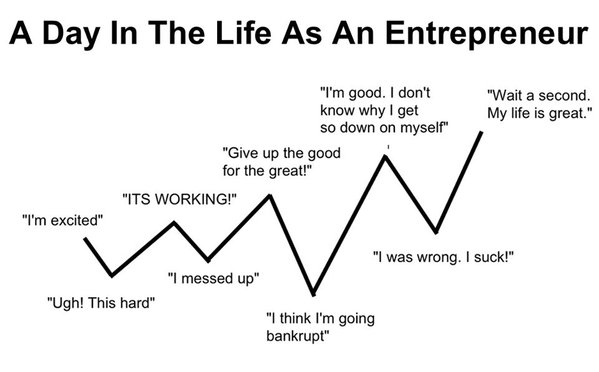
With a 30% depression rate, over three times that of the general population, entrepreneurs have a greatly increased risk of entrepreneur suicide. But due to social stigmas and the pressure to succeed, entrepreneurs never seek help or support for their depression.
Think about it: How many times did you say “I’m all right,” or “I’m fine,” in the last week? Probably a lot. But why is that? It doesn’t say anything about what’s going on.Most of the time, it’s like saying, “I’m eating a crap sandwich right now, but let’s both pretend that I said something real.”
Being “fine” can be a mask for deeper problems. We may say “I’m fine” even when things are bad— whether it’s just one of those days when things went wrong or something bigger like long-term depression. It could be even worse for entrepreneurs who are trying to prove that they have what it takes and feel like they have to pretend they’ve got it all together as they ride the inevitable ups and downs of the startup rollercoaster of entrepreneur suicide.
Everyone gets upset when they bomb a show, spill their latte on their pants, or get their car towed. But many entrepreneurs are living with the day-to-day, long-term sadness of depression. “It’s not just feeling bummed,” says the psychologist Glen Moriarty. “Depression is going to take a more significant toll.”

Moriarty, who founded a website that helps people chat about depression online with trained counselors, said depression involves two weeks or more of sadness, negative self-esteem, a change in sleep patterns, and a host of other symptoms that keep you from living normally.
Depression and Suicide
If you’re an entrepreneur and you’re living with depression, you’ve got a lot of company. 1 in 3 entrepreneurs experience depression, according to a study by Dr. Michael Freeman, a clinical professor at the University of California, San Francisco.
Since depression is a significant cause of suicide, this is an alarming statistic. You don’t have to look far to see that many bright and promising young entrepreneurs have taken their lives tragically. It’s an epidemic, some say, and not enough people are talking about it.
In May 2015, 31-year-old Austen Heinz, CEO of Cambrian Genomics, took his own life. In July, 29-year-old Faigy Mayer, CEO of Appleton, jumped off a roof in New York City. Aaron Schwartz, a 26-year-old partner at Reddit, hung himself in 2013. 47-year-old Jody Sherman, the founder of Ecomom, shot himself that year. One of his colleagues, Ovik Banerjee, 24, followed a year later. And 22-year-old Ilya Zhitomirskiy, CEO of Diaspora, took his life in 2011. There are a lot more names.
In 2010, suicide was the leading cause of death for people aged 15-49 in the developed world. That’s way beyond the death rates of lung cancer and murder.
Newsweek pointed out in 2013 that suicide rates in America have been rising since 1999.
In the last five decades, millions of lives have been rebuilt for the better, but in this brighter tomorrow, we are suffering unprecedented despair. In a time of ever-increasing social progress and astounding innovations, we have never been more burdened by sadness or more consumed by self-harm. ~Tony Dokoupil
Why are the entrepreneurs hit so hard?
Depression among entrepreneurs is much higher than depression among Americans in general, which is estimated to be about 7%—although that number may well be much higher because of the stigma associated with talking about mental health issues.
But at face value, it suggests that entrepreneurs are four times more likely to have depression than anyone else. Moriarty said it might be linked to the stress of the roller coaster of emotions that entrepreneurs are living with. And since 90% of startups fail, it’s a concern. Expectations are the biggest problem.
The greater the gap between where you are and your expectations of where you should be, the higher the stress ~ Glen Moriarty
Sometimes depression worsens when people feel that they’re all alone and that they can’t admit that they feel bad. They think showing vulnerability is a sign of weakness. On Facebook, they see signs that everyone else has it together— often because their friends (and everybody, really) show off the fun, happy parts of their lives and leave out self-doubt, uncertainty, and failure.
Against the backdrop of this rah-rah, everybody’s killing it, everyone’s doing great language, it makes it even more difficult to be open about it. ~ Brad Feld.
Brad Feld, an investor in the Colorado-based Foundry Group, has spent the last decade blogging about his depression. He wants to change the approach of the technology industry to mental health. “We’re told over and over again that as leaders we have to be strong, we don’t have to show any weakness,” Feld said. “That tone and that dynamic is incredibly difficult to deal with, especially against the backdrop of huge amounts of stress and anxiety that startups and the startup world are creating.”
Aiming high can make you feel like crap sometimes. People who set the highest goals for themselves often end up being the most miserable. They add new goals to their to-do lists as they tick off achievements. It feels like they’re never good enough at all. Not successful enough, not rich enough, not productive enough, not happy enough. They are at risk for entrepreneur suicide.
But to measure yourself against others means that you run the risk of feeling that way. Because you are you, not whoever you compare yourself to, and you can’t live their lives. Just take Tim Ferriss. His entire lifestyle shtick is centered around success in life in the most efficient way possible. So it was shocking to read his May blog, where Tim shared how he fought depression and suicidal thoughts when he was a senior at Princeton.
Seeking Help for Entrepreneur Suicide Risk
Moriarty is the founder of 7 Tea Cups, a web site that provides 24/7 free counseling. It has a special section for startup employees and founders. “In an ideal world, we’d like people to have enough support from their friends and family to help them out, but we just don’t live in that world,” Moriarty said.
7 Tea cups has over 130,000 counseling conversations a month.



